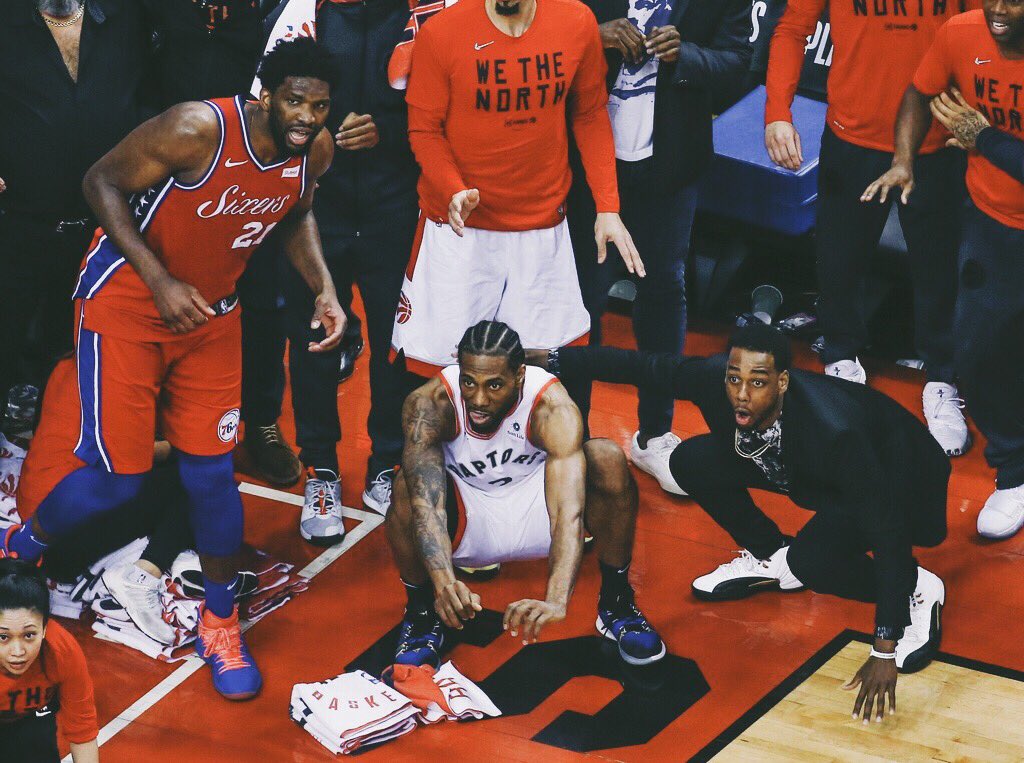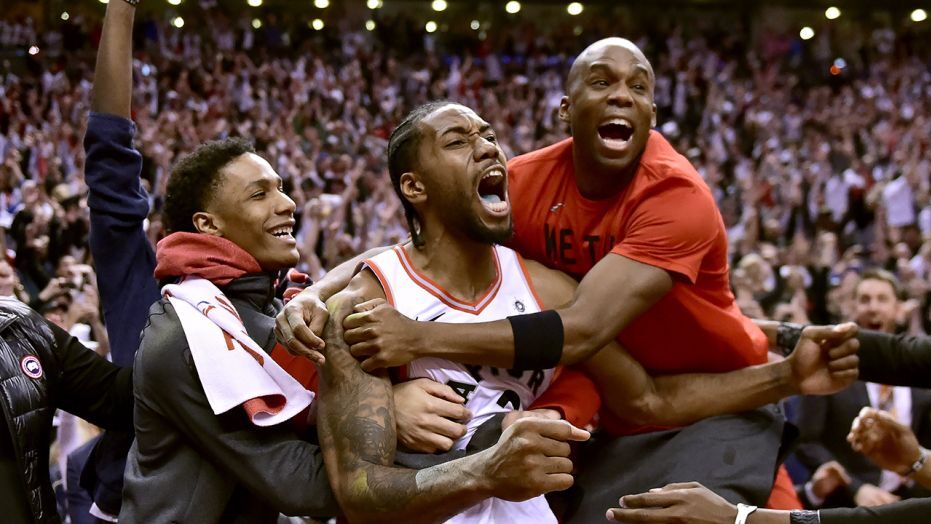The two shots would not have looked more similar if they had been scripted by a film writer in search of an easy payoff. The only difference was the result. The two shots were taken in 2001 and 2019, 18 years apart, but they are now intrinsically linked in Raptors’ franchise lore. In 2001, Vince Carter and the Toronto Raptors were down a point to the Philadelphia 76ers, 88-87, with 2.0 seconds on the clock. On an inbounds pass, Carter gets the ball curling towards the baseline, pump-fakes to throw his defender into the air, and launches the fadeaway. It hits the rim and flies into the air. As we well know, it flies long. The Sixers advance to face the Milwaukee Bucks in the Eastern Conference Finals, and the Raptors advance to face more than a decade of basketball purgatory.
That was then, and this is now.
“2001 it didn’t fall for Vince. 2019 it fell for Kawhi,” Kyle Lowry told Eric Smith after Toronto’s victory. Where was Lowry 18 years ago? “Don’t matter. I’m here now.”
Sunday night saw the best of Toronto and the worst of Toronto. Toronto and Philadelphia played a brutally physical, low-scoring game for the modern NBA. The 92-90 final score was an homage to the days of physical basketball, more driven by brawn than skill. The final score would be more recognizable by a Carter-led Raptors team than the modern high-powered offense led by Kawhi Leonard. Toronto’s offense was theatrically bad, matched only by how stringently dominant was Toronto’s defensive effort.
The Raptors’ team identity is rooted in their defense. Sure, they finished the regular season with equal rankings for both offense and defense, both fifth-best in the league. But every Raptor in the rotation has more defensive ability than scoring touch. Much of the offense during the regular season actually came from the Raptors’ defense, in the form of fastbreak scoring after forcing live turnovers. Toronto was one of the NBA’s most frequent purveyors of transition buckets, and they were the NBA’s most efficient purveyor of transition buckets. In the playoffs, Toronto’s facade of equality between their defense and offense has melted away like Danny Green’s jumper. In the playoffs, the Raptors have been the second-best defense in the league and the eighth-worst offense. That binary was stressed to comical lengths in game seven.
Kawhi Leonard faces a near-identical shot as had Carter, almost two decades later. In 2019 for Leonard, the score is tied 90-90, with 4.2 seconds on the clock. On an inbounds pass, Leonard catches the ball and curls towards the baseline, driving away from Ben Simmons. Joel Embiid lumbers towards Leonard. Leonard takes one more dribble, pivots hard just inside the arc, and fades away, lofting a moon ball over Embiid’s unfurled 7’6” wingspan.
Throughout the entirety of the game, it wasn’t precisely that the Raptors’ offense was miserable; despite the misses, they created good shots. Regardless, the Raptors missed their first seven triples. As has been a horribly familiar theme throughout the series, good shooters turned down great shots. Serge Ibaka eventually hit the Raptors’ first triple late in the second quarter. It was especially unlikely, as Ibaka shot 29 percent from deep in the regular season, and that mark dropped to 27 percent in the regular season. He is far from the Raptors’ best option from behind the arc, and his make didn’t improve his teammates’ shooting over the course of the game. The Raptors finished shooting 7-for-30 from deep, an inferior mark to the Sixers. Shooting, however, did not determine this game.
Leonard, especially, had trouble with his usually effortless midrange game. The meat of his scoring often comes in the midrange, where he dances, hesitates, lulls defenders into mistakes, and drills jumpers. That didn’t happen against the Sixers, as Leonard shot 16-of-39 in the game. Leonard’s 39 attempts, incidentally, are the most in franchise history, either regular season or playoffs. Despite all the attempts, Leonard’s jumpers were short, hitting front rim throughout the night.
Leonard’s last shot, his game-winning shot, his Carter shot, hits the front rim. He puts so much arc on it to get over Embiid’s arms that it seems impossible it could drop. But it hits the front of the rim, the back of the rim, the side, teetering on the rim some more. At some point, the buzzer sounds, and the game is over. But still the ball lingers over the rim. A lifetime passes between the space of the ball leaving Leonard’s hands and it finally deciding the fate of the game.
“I think at first a lot of us were like, ‘ah, it doesn’t look too good,” said Danny Green. “Then it got one bounce and it was like, ‘OK.’ And then the second bounce it was, ‘oh shit, we might have a chance here.’”
“I really felt when it hit the rim that it was going to end up going in,” lamented Brett Brown after the game, choosing to describe the moment literally instead of emotionally. “It didn’t surprise me when it went in. When it hits at that angle and goes straight up, you feel like there’s a chance it’s actually going to go in.”
In a rock fight of a basketball game, the winner is so often determined by unlikely sources. Ibaka was one of the Raptors’ unlikely heroes. His contributions didn’t end with hitting the Raptors’ first triple of the game. He altered every shot, playing ferocious defense. He corralled four offensive rebounds himself, one fewer than the five that Philadelphia snatched as a team. Ibaka ended up with three makes from deep, including a heavily contested pull-up that required an altered release point; Ibaka may hit that shot once in a hundred tries, but the make put Toronto ahead 73-68. It seemed like the game was won, but there were more heroics required.
The closer a game gets, the more violent and stagnant with increasingly less time remaining, the more important it is to have the game’s best player. And Kawhi Leonard was the best player. Midway through the fourth quarter, Leonard began to completely dominate the game. With just under seven minutes left, and the Sixers ahead by two, Leonard hit a deep triple. He followed that up with a pull-up jumper, then a floating jumper, both from the midrange. Then free throws. Then another triple. All told, Leonard scored 15 points in the fourth quarter.
His saved his best for last.
Leonard’s shot drops. After caressing every part of the rim, it trickles through the mesh. Toronto wins. Two decades of echoes from Carter’s miss are silenced in one instant, drowned out by the reverberations from Leonard’s make. The immediate explosion of Toronto’s reaction quiets Carter’s 2001 miss forever. The crowd explodes. Press row explodes. Kawhi Leonard himself explodes, screaming for the first time in recorded history. He accomplishes what Carter couldn’t, making the first game seven series-winning buzzer beater in NBA history. He screams because he accomplished something no NBA player in history ever has.
“Pretty much, I’m a guy that acts like I’ve been there before,” said a deadpan Leonard after the game, his excitement seemingly left on the court. “So probably the last time you’ve seen me scream was when we won.”
Leonard has now done it all. So don’t expect to ever see him scream on a basketball court again.
“It seemed like it was 30 seconds, but probably took all of 0.8 seconds,” said Green after the game. “But once it went in I think everyone was just ridiculously excited. The whole building. I think they’re still yelling out there.”
Green was speaking moments after the game. But by now, the stadium is quiet and empty, with nothing but spilled popcorn and beer to mark Leonard’s heroics. But Green is still telling the truth. They are still screaming out there for Leonard, the volume of his game winner spilling beyond the confines of the Scotiabank Arena into downtown Toronto and Twitter and beyond. For too long, any screams about the Raptors were pained, haunted by Carter’s miss. But that’s all over now. The Raptors have exited purgatory. The 18 years finally have their bookend, their natural conclusion in Leonard’s shot. Win or lose going forward, the Raptors will live happily ever after. No matter what happens during the rest of the playoffs, no matter which team employs Leonard next year, in one night, the history of the franchise was altered. Future screams will be frenzied, joyous, mirroring Leonard’s own. The echoes of Leonard’s shot, just like after Carter’s before him, will linger for a long, long time.
I couldn’t get over the similarities between Kawhi’s and Vince’s shots. So I played them side-by-side.
Unreal. What a moment. pic.twitter.com/zAHNqJOWyl
— Jonathan Soveta (@eighteenyards) May 13, 2019
Editor’s note: An earlier version of this piece incorrectly described Leonard’s shot as having hit the backboard. Nope. Upon further inspection, all rim, all day.



